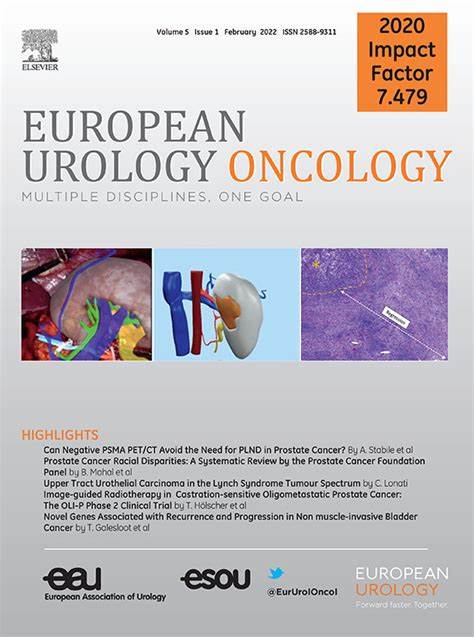Health-related Quality of Life Assessment in Renal Cell Cancer: A Scoping Review
IF 8.3
1区 医学
Q1 ONCOLOGY
引用次数: 0
Abstract
Background and objective
In oncology, patient-reported outcome measures (PROMs) capturing health-related quality of life (HRQOL) play an increasing role in clinical trials, drug approval, and policy making. This scoping review aimed to identify and elaborate on HRQOL-focussed PROMs used in renal cell cancer (RCC) clinical trials.
Methods
MEDLINE, Web of Science, PsychINFO, Academic Search Elite, CINAHL, Embase, and the Cochrane Library were searched systematically for original peer-reviewed articles on clinical trials including RCC patients and using PROMs, published between 1950 and 2023. Prespecified trial characteristics and information on the PROMs used were extracted. Frequencies and proportions of categorical data, and ranges and medians of continuous variables were calculated.
Key findings and limitations
Of the 48 unique studies included, the majority followed a randomised controlled design (34, 71%) and evaluated systemic treatments (38, 79%). The trials used 27 different PROMs (max = 6, median = 2), of which only 4 (15%) were developed specifically for kidney cancer patients. Of the trials, 46% did not use any RCC-specific PROM. European Quality of Life—5 Dimensions (EQ-5D), European Organisation for Research and Treatment of Cancer Quality of Life Core Questionnaire (EORTC QLQ-C30), Functional Assessment of Cancer Therapy Kidney Symptom Index (FKSI) —15/19-item version, FKSI—Disease Related Symptoms, and Functional Assessment of Cancer Therapy—General (FACT-G) were the most frequently used questionnaires, with pain, ability to work, fatigue, worry, and sleep quality being the most commonly assessed issues.
Conclusions and clinical implications
A variety of PROMs are used in RCC patients, hindering interpretability across trials. The PROMs used differ in terms of both the domains assessed and how the issues are translated into questionnaire items. Though RCC-specific PROMs exist, these have flaws in terms of relevance to patients. To answer predefined relevant HRQOL research questions, revised RCC-specific PROMs and standardisation of their integration into clinical trials are warranted.
Patient summary
Researchers are more and more interested in the health-related quality of life of kidney cancer patients and use questionnaires to measure it. This review shows that there are many different health-related quality of life questionnaires that are used in different combinations in clinical trials for kidney cancer patients. This makes it very difficult to compare these study results and draw reliable conclusions for the actual clinical treatment. It was even found that some of the questionnaires used do not capture things that patients actually consider important (eg, emotional issues such as dealing with thoughts about cancer and depression). Therefore, more work needs to be done to develop questionnaires that ask what is really important to kidney cancer patients’ health-related quality of life. If these questionnaires are used in a consistent way in clinical trials, the results can be better compared. This will help treat kidney cancer patients in the best possible way.
肾细胞癌中与健康相关的生活质量评估:范围综述。
背景和目的:在肿瘤学领域,反映健康相关生活质量(HRQOL)的患者报告结局指标(PROMs)在临床试验、药物审批和政策制定中发挥着越来越重要的作用。本范围综述旨在确定并详细阐述肾细胞癌(RCC)临床试验中使用的以HRQOL为重点的PROMs:方法:系统检索了 MEDLINE、Web of Science、PsychINFO、Academic Search Elite、CINAHL、Embase 和 Cochrane 图书馆在 1950 年至 2023 年间发表的关于包括 RCC 患者和使用 PROMs 的临床试验的原始同行评审文章。提取了预设试验特征和所用 PROMs 的相关信息。计算了分类数据的频率和比例以及连续变量的范围和中位数:在纳入的 48 项独特研究中,大部分采用了随机对照设计(34 项,占 71%),并对系统治疗进行了评估(38 项,占 79%)。这些试验使用了27种不同的PROM(最多=6,中位数=2),其中只有4种(15%)是专门为肾癌患者开发的。在这些试验中,46%的试验未使用任何针对RCC的PROM。欧洲生活质量-5维度(EQ-5D)、欧洲癌症研究和治疗组织生活质量核心问卷(EORTC QLQ-C30)、癌症治疗肾脏症状功能评估指数(FKSI)-15/19项版、FKSI-疾病相关症状和癌症治疗功能评估-一般(FACT-G)是最常用的问卷,其中疼痛、工作能力、疲劳、担忧和睡眠质量是最常评估的问题:RCC患者使用的PROM多种多样,妨碍了不同试验之间的可解释性。所使用的 PROM 在评估的领域和如何将问题转化为问卷项目方面都有所不同。虽然存在针对 RCC 的 PROM,但这些 PROM 在与患者的相关性方面存在缺陷。为了回答预先确定的相关 HRQOL 研究问题,有必要修订 RCC 专属的 PROM,并将其标准化纳入临床试验中:研究人员对肾癌患者的健康相关生活质量越来越感兴趣,并使用问卷对其进行测量。本综述显示,在肾癌患者的临床试验中,有许多不同的健康相关生活质量问卷以不同的组合方式使用。这就很难对这些研究结果进行比较,并为实际临床治疗得出可靠的结论。研究甚至发现,有些调查问卷并没有反映出患者实际认为重要的问题(例如,情绪问题,如对癌症的看法和抑郁)。因此,还需要做更多的工作来开发调查问卷,询问哪些因素对肾癌患者的健康相关生活质量真正重要。如果在临床试验中以一致的方式使用这些问卷,就能更好地对结果进行比较。这将有助于以最佳方式治疗肾癌患者。
本文章由计算机程序翻译,如有差异,请以英文原文为准。
求助全文
约1分钟内获得全文
求助全文
来源期刊

European urology oncology
Multiple-
CiteScore
15.50
自引率
2.40%
发文量
128
审稿时长
20 days
期刊介绍:
Journal Name: European Urology Oncology
Affiliation: Official Journal of the European Association of Urology
Focus:
First official publication of the EAU fully devoted to the study of genitourinary malignancies
Aims to deliver high-quality research
Content:
Includes original articles, opinion piece editorials, and invited reviews
Covers clinical, basic, and translational research
Publication Frequency: Six times a year in electronic format
 求助内容:
求助内容: 应助结果提醒方式:
应助结果提醒方式:


